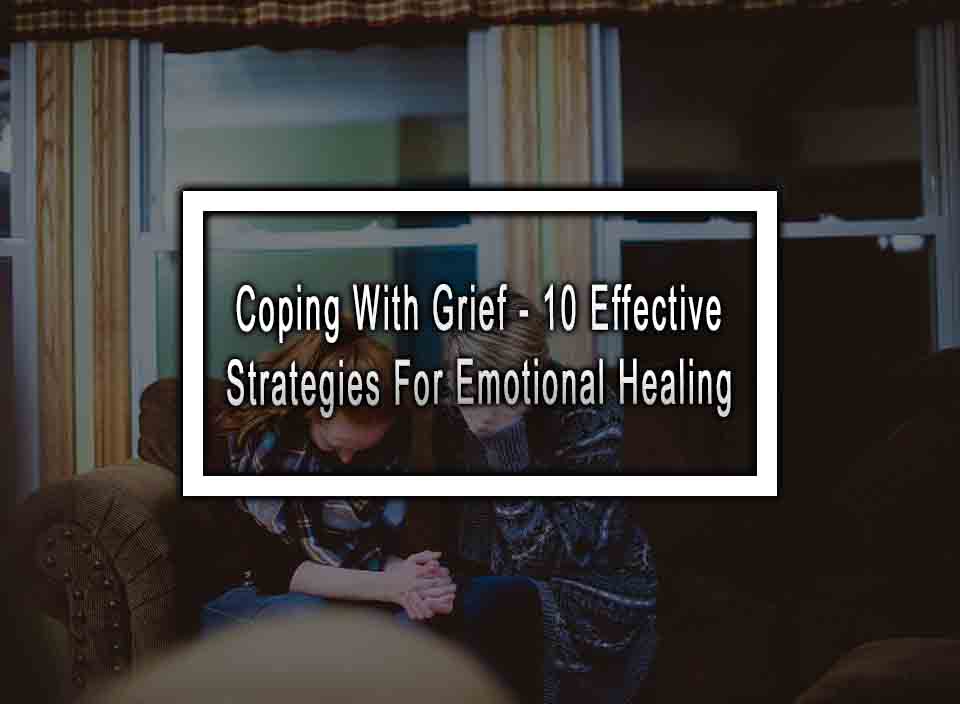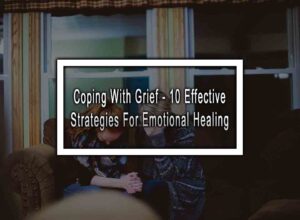Table of Contents
ToggleCoping With Grief: Ways to Cope with Grief and Embrace Healing
Grieving the loss of a loved one can be an overwhelming and challenging experience. Coping with grief is a personal journey, but finding effective strategies to navigate through the pain can lead to emotional healing and growth. In this article, we have compiled 10 proven techniques to help you cope with grief and find solace amidst the storm.
1. Seek Support from Loved Ones
Navigating the turbulent waves of grief can be eased by seeking support from your family and friends. Surrounding yourself with loved ones who understand your pain can provide emotional comfort and shared strength during this difficult time.
2. Join Grief Support Groups
Finding solace among others who have experienced similar losses can be immensely healing. Grief support groups offer a safe space to share your feelings, gain insights from others, and receive support from compassionate individuals who understand the complexities of grief.
3. Express Your Feelings Through Journaling
Writing down your thoughts and emotions in a journal can be an effective outlet for processing grief. Letting your feelings flow onto paper allows you to reflect on your emotions, release pent-up sorrow, and gain a clearer understanding of your grieving process.
4. Engage in Regular Physical Exercise
Physical activity not only improves your overall well-being but also aids in coping with grief. Engaging in regular exercise releases endorphins, which promote a positive mood and reduce feelings of sadness. Consider activities such as walking, yoga, or swimming to uplift your spirit.
5. Practice Mindfulness and Meditation
Finding moments of peace and tranquility amidst grief can be invaluable. Embracing mindfulness techniques, such as deep breathing exercises and meditation, helps redirect your focus and create a sense of calm. These practices facilitate self-awareness and allow you to observe your emotions without judgment.
6. Honor the Memory of Your Loved One
Celebrating and honoring the memory of the person you lost can help bring a sense of comfort and peace. Create rituals or traditions, such as lighting a candle, planting a tree, or sharing stories, that pay tribute to their life and keep their memory alive in your heart.
7. Explore Art Therapy
Art therapy provides an expressive outlet for coping with grief. Engaging in creative activities like painting, drawing, or crafting can help channel your emotions into something tangible. This process allows for self-discovery, and emotional release, and can serve as a form of healing.
8. Allow Yourself to Grieve
Give yourself permission to grieve in your own way and at your own pace. Remember that grief is a natural response to loss, and suppressing your emotions may hinder the healing process. Allow yourself to feel the pain, embrace the emotions, and be patient with yourself as you navigate through this difficult time.
9. Seek Professional Help if Needed
If grief becomes overwhelming and begins to interfere with your daily life, seeking professional help from a therapist or counselor can be beneficial. These professionals are trained to provide guidance, support, and specific coping mechanisms tailored to your individual needs.
10. Embrace Hope and Positive Affirmations
While grief may feel all-consuming, embracing hope and positive affirmations can help restore resilience and foster growth. Surround yourself with positive influences, practice self-care, and remind yourself that healing is possible. Allow yourself to envision a future filled with joy and renewed purpose.
Conclusion
Coping with grief is a personal journey that requires patience, self-compassion, and the willingness to seek support. By utilizing these 10 effective strategies, you can navigate through the pain and find solace in your healing process. Remember, grief may never fully disappear, but with time and the right coping mechanisms, you can reclaim your life and honor the memory of your loved one.
Coping With Grief FAQ
Here are the most common questions about coping with grief.
1. How long does grief last?
There is no set timeline for grief. It is a deeply personal experience, and everyone grieves in their own way and at their own pace. Some people may start to feel better after a few months, while others may take years to heal. It is important to remember that there is no right or wrong way to grieve.
2. What are the common symptoms of grief?
Common symptoms of grief include sadness, numbness, anger, guilt, confusion, difficulty concentrating, changes in appetite or sleep patterns, and a sense of emptiness. Physical symptoms such as fatigue, headaches, and digestive problems may also occur.
3. Is it normal to feel angry during grief?
Yes, it is normal to feel anger during the grieving process. Anger is a natural response to loss and can be directed toward oneself, others, or even the deceased. It is important to express and release these emotions in a healthy way.
4. How can I support someone who is grieving?
To support someone who is grieving, it is important to listen to them without judgment, offer a shoulder to cry on, and provide them with practical support such as helping with household chores or running errands. Avoid trying to fix their grief or offer unsolicited advice.
5. Is it possible to move on from grief?
While grief never completely goes away, it is possible to move forward and find meaning in life again. Over time, the intensity of grief usually lessens, and individuals are able to integrate their loss into their lives in a way that allows them to move forward while still honoring the memory of the person or thing they lost.












